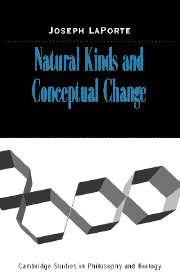Book contents
- Frontmatter
- Contents
- Preface
- Introduction
- 1 What Is a Natural Kind, and Do Biological Taxa Qualify?
- 2 Natural Kinds, Rigidity, and Essence
- 3 Biological Kind Term Reference and the Discovery of Essence
- 4 Chemical Kind Term Reference and the Discovery of Essence
- 5 Linguistic Change and Incommensurability
- 6 Meaning Change, Theory Change, and Analyticity
- Notes
- References
- Index
1 - What Is a Natural Kind, and Do Biological Taxa Qualify?
Published online by Cambridge University Press: 10 December 2009
- Frontmatter
- Contents
- Preface
- Introduction
- 1 What Is a Natural Kind, and Do Biological Taxa Qualify?
- 2 Natural Kinds, Rigidity, and Essence
- 3 Biological Kind Term Reference and the Discovery of Essence
- 4 Chemical Kind Term Reference and the Discovery of Essence
- 5 Linguistic Change and Incommensurability
- 6 Meaning Change, Theory Change, and Analyticity
- Notes
- References
- Index
Summary
Before I undertake an examination of natural kinds and reference to them, I will clarify what natural kinds and natural-kind terms are. Philosophers who discuss natural-kind terms seldom offer any analysis of what they are supposed to be. Prominent philosophers tend just to offer examples. Their examples are supposed to help readers grasp intuitively what is intended. The most common examples of natural-kind terms presented in the literature are perhaps terms for biological species and higher taxa: ‘Tiger’, ‘elm’, and ‘mammal’ are all discussed extensively in the literature. Chemical kind terms, such as ‘water’ and ‘jade’, are also presented as examples with great frequency.
My primary interest in this book has to do with kind terms from biology. To a lesser extent I also examine the other prominent group of natural-kind terms, those from chemistry, in order to show that many of the central observations that I make about specifically biological kinds are not limited to the realm of biological kinds.
In this chapter, I defend the position that the terms from biology and chemistry that are typically supposed to be natural-kind terms really are natural-kind terms. As I have said, most analytic philosophers accept terms like ‘tiger’ and ‘water’ as paradigmatic, as words that are “natural-kind words if any are,” as one introductory textbook says of them (Platts 1997, p. 264). Biological species in particular tend to be regarded as paradigmatic natural kinds.
- Type
- Chapter
- Information
- Natural Kinds and Conceptual Change , pp. 8 - 32Publisher: Cambridge University PressPrint publication year: 2003



